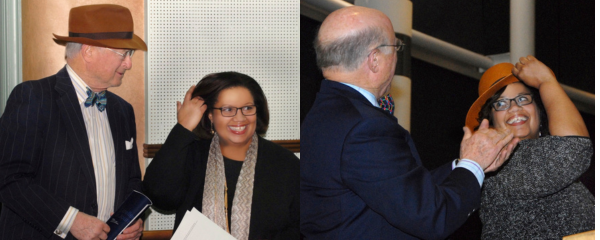This article appeared in the Fall 2023 issue of the Wallace House Journal.
Not long after Lynette Clemetson was named director of the Knight-Wallace Fellowship in 2016, I sat at a long wooden table, facing her and members of the selection committee, trying to convince them I had a great idea for a fellowship.
The truth is all I had were questions. Since bluffing my way into my first reporting job at the Queens Tribune back in 2003, I’d been trying to figure out how to keep my head above water in the journalism world. Half the newsrooms on my résumé had collapsed or closed. But I stayed employed, jumping from job to job, in part by getting clicks and traffic with whatever was the new way to communicate: blogging, listicles, slide shows, newsletters, tweeting.
For a while, I carried a camcorder and tripod and uploaded entire press conferences onto a new website called YouTube.
But by the time I was sitting at that wooden table in Ann Arbor, none of it made sense anymore. The news cycle I had helped accelerate was too fast. Way too fast. Every time I started reporting on one story—figuring out what was true and what wasn’t—I’d get distracted with a breaking news alert. And another. Colin Kaepernick was kneeling. Donald Trump was tweeting “covfefe.” Somehow, doing what I had always done didn’t seem like enough.

So, I applied to the fellowship and sat across from Lynette. The most memorable moment of my interview was when she asked me about my hobbies. I described my penchant for putting audio clips of news on top of musical beats. My favorite one: Excerpts of Donald Trump and Hillary Clinton’s third debate, on top of Tupac’s “Gangsta Party.”
Everyone laughed and Lynette shared a part of her bio that I had missed; she had been a DJ at a hip-hop station. She seemed like a new kind of director.
I got selected and at the first big event of the year, the Hovey Lecture, featuring ProPublica’s Alec MacGillis ’10, Lynette welcomed all the guests warmly, then politely told them that there was something missing from the event: new people. Events like this one should be out there, at libraries, theaters, anywhere, really, where a diverse, possibly younger, crowd who had never heard of Wallace House and wasn’t plugged into journalism would go. Perfect, I thought—I was moving toward Wallace House just as Lynette was moving Wallace House somewhere else.
Thanks to Wallace House’s interest in bringing more events to more people in more locations, I found myself getting around the only way I knew how: walking. And it did me good.
But her timing couldn’t have been better. The world was changing, and journalists needed to be among the people, soaking it all in and sharing what they do with people who perceived them as suspect. Wallace House brought Pulitzer Prize-winning reporter David Fahrenthold of The Washington Post for a public event on his coverage of Donald Trump’s charitable giving. Before he spoke, Lynette arranged for me and another Fellow obsessed with politics to have lunch with him. In February, Wallace House brought then NPR host Joshua Johnson to record a live episode of the show “1A.” Shortly after, New York Times columnist Bret Stephens gave a talk titled “Free Speech and the Necessity of Discomfort.” To prove his thesis, he stood on stage as an endless parade of undergrads pelted him with sharply worded statements, sometimes delivered in the form of a question.
This was not the Wallace House back garden. I was witnessing journalism and reporting, surrounded by the people it was affecting. It reminded me of my Queens Tribune days, with late nights at community board meetings and early-morning doorknocking with local candidates.
Thanks to Wallace House’s interest in bringing more events to more people in more locations, I found myself getting around the only way I knew how: walking. And it did me good.
Since the fellowship, I’ve been tweeting less and absorbing more. Stories are driven more by accountability and less by clicks. It’s been five years, one wedding, a pandemic, a newborn, and two jobs since I left Ann Arbor. And it’s been exactly zero days since Lynette’s words about being out and in touch with the world have left me.
Azi Paybarah is a 2018 Knight-Wallace Fellow and national reporter covering campaigns and breaking politics at The Washington Post.
